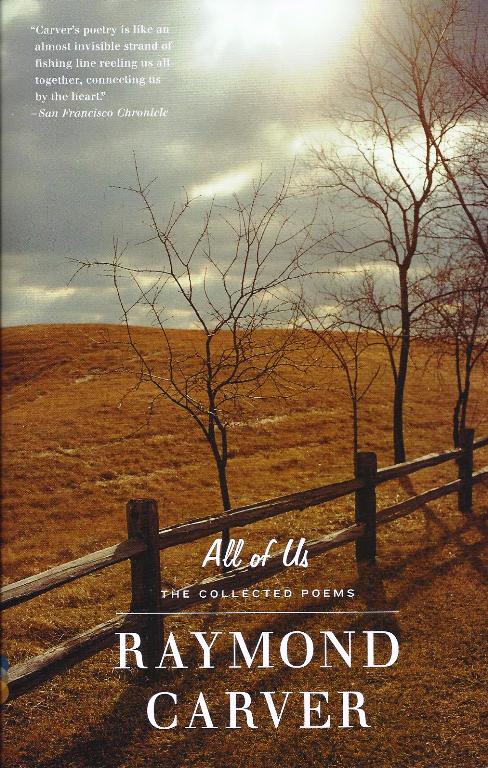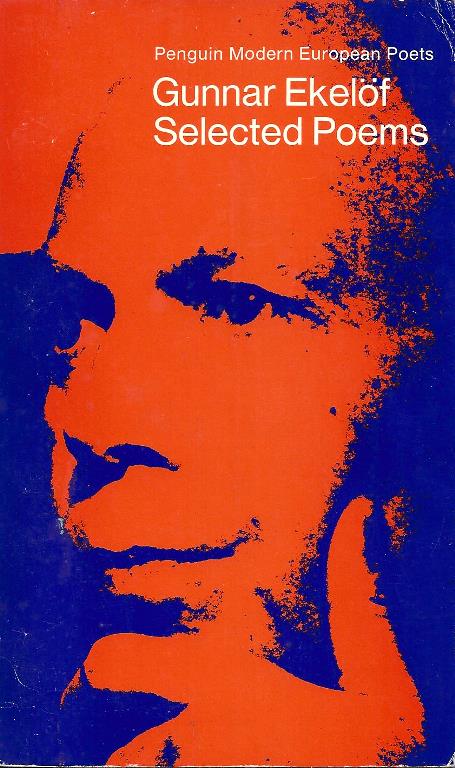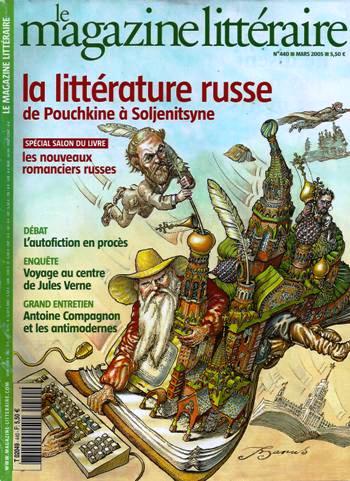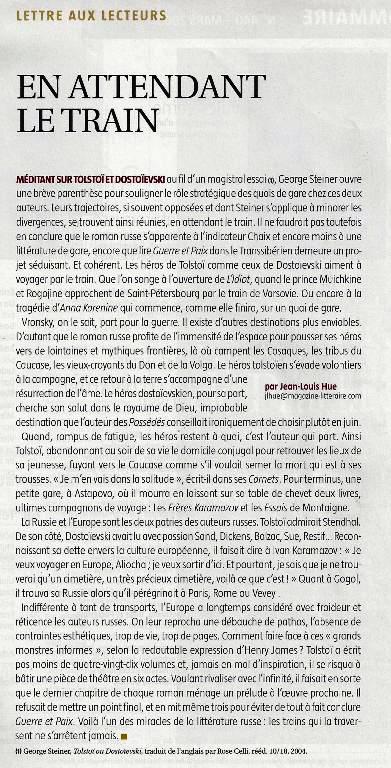|
|
The Attic
Her brain is an attic where things
were stored over the years.
From time to time her face appears
in the little windows near the top of the house.
The sad face of someone who has been locked up
and forgotten about.
Gác Xép
Não của nàng thì là cái gác
xép
Nơi lưu cữu từ bao đời, đồ này vật nọ
Lâu lâu khuôn mặt của nàng hiện ra nơi khung
cửa nhỏ gần chỏm nhà
Bộ mặt buồn bã của 1 người bị khoá, nhốt, và quên
bỏ, từ đời nảo đời nào
Kafka’s Watch
from a letter
I have a job with a tiny salary of 80 crowns, and
an infinite eight to nine hours of work.
I devour the time outside the office like a wild beast.
Someday I hope to sit in a chair in another
country, looking out the window at fields of sugarcane
or Mohammedan cemeteries.
I don't complain about the work so much as about
the sluggishness of swampy time. The office hours
cannot be divided up! I feel the pressure
of the full eight or nine hours even in the last
halfhour of the day. It's like a train ride
lasting night and day. In the end you're totally
crushed.You no longer think about the straining
of the engine, or about the hills or
flat countryside, but ascribe all that's happening
to your watch alone. The watch which you continually hold
in the palm of your hand. Then shake. And bring slowly
to your ear in disbelief.
The Lightning Speed of the Past
The corpse fosters anxiety in men who believe
in the Last Judgment, and those who don't.
- ANDRE MALRAUX
He buried his wife, who'd died in
misery. In misery, he
took to his porch, where he watched
the sun set and the moon rise.
The days seemed to pass, only to return
again. Like a dream in which one thinks,
I've already dreamt that.
Nothing, having arrived, will stay.
With his knife he cut the skin
from an apple. The white pulp, body
of the apple, darkened
and turned brown, then black,
before his eyes. The worn-out face of death!
The lightning speed of the past.
http://www.tanvien.net/Portrait/Ray.html
http://www.tanvien.net/tgtp_02/Raymond_Carver.html
http://tanvien.net/new_daily_poetry/Carver_Page.html
Raymond
Carver
Carver: Poems
Carver by Rushdie
Enright on Carver
Ray
AUTUMN
This yardful of the landlord's
used cars
does not intrude. The landlord
himself, does not intrude. He hunches
all day over a swage,
or else is enveloped in the blue flame
of the arc-welding device.
He takes note of me though,
often stopping work to grin
and nod at me through the window. He even
apologizes for parking his logging gear
in my living room.
But we remain friends.
Slowly the days thin, and we
move together towards spring,
towards high water, the jack-salmon,
the sea-run cutthroat.
AUTOMNE
Ce jardin plein des voitures
usagées du proprio
ne me dérange pas. Le proprio
lui-même n'est pas dérangeant. II reste courbé
toute la journée au-dessus d'un porte-pièces,
ou bien enveloppé par la flamme bleue
de la lampe à souder.
II fait attention à moi pourtant,
s'arrêtant souvent de travailler pour m'adresser
un sourire ou un signe de tête à travers le carreau.
[Il s' excuse
même d'avoir remisé sa tronconneuse
dans ma salle de séjour.
Mais nous restons amis.
Lentement les jours s'allongent, et nous
avancons ensemble vers le printernps,
vers la montée des eaux, le frai des saumons
et la truite anadrome.
MÙA THU Ở ĐÂY
ĐẸP NÃO NÙNG 2
Nguyễn
Quốc Trụ
MÙA THU Ở ĐÂY ĐẸP NÃO
NÙNG

Autumn
The wind wakes,
sweeps the thoughts from my mind
and hangs me
in a light that smiles for no one:
what random beauty!
Autumn: between your cold hands
the world flames.
1933
Octavio Paz: First Poems (1931-1940)
Mùa Thu
Gió thức dậy
Quét những ý nghĩ ra khỏi cái đầu của anh
Và treo anh
Trong ánh sáng mỉm cười cho chẳng ai
Cái đẹp mới dưng không, tình cờ làm
sao?
Mùa thu: giữa lòng bàn tay lạnh của em
Tình anh sưởi ấm
[nguyên văn, thế giới bập bùng ngọn lửa]
~~oOo~~
Here
My footsteps in this street
echo
in another street
where
I hear my footsteps
passing in this street
where
Only the mist is real
[1958-1961]
Đây
Tiếng bước chân của
tôi
trong con phố này
vọng lên
trong một con
phố khác
nơi
tôi nghe
những bước chân của mình
qua con phố này
nơi
Chỉ sương mù là có thực
~~oOo~~

Apollinaire: Alcools
Mùa thu bịnh
Mùa thu bịnh và
đáng mê làm sao
Mi sẽ chết khi bão thổi qua những vườn hồng
Khi tuyết xuống
Trong những vườn cây
Mùa thu đáng
thương, tội nghiệp
Chết trong cái màu trắng, trong cái giầu
sang
Của tuyết và của trái chín
Ở nơi cuối trời
Những cánh chim bồ cắt bay lượn
Bên trên những thuỷ thần già, tóc xanh
và lùn
chẳng bao giờ yêu
Ở nơi bìa rừng
Những con hươu thèm nhau, rền rĩ
Ui chao, mùa thu, mùa,
tôi mới yêu làm sao
Những tiếng thì thầm của nó
Những trái cây rụng xuống, không ai hái
Gió và rừng đều thi nhau khóc
Tất cả những giọt nước mắt, mùa thu, lệ thu, từng chiếc,
từng chiếc
Những chiếc lá con người dẫm lên
Một con tàu chạy
Và đời cứ thế mà trôi đi.
~~oOo~~
Automne
Dans le brouillard s'en vont un paysan cagneux
Et son bœuf lentement dans le brouillard d'automne
Qui cache les hameaux pauvres et vergogneux
Et s'en allant là-bas le paysan chantonne
Une chanson d'amour et d'infidélité
Qui parle d'une bague et d'un cœur que l'on brise
Oh! l'automne l'automne a fait mourir l'été
Dans le brouillard s'en vont deux silhouettes grises
Apollinaire
Mùa Thu
Trong sương mù, một người nhà
quê đi, chân liềng khiềng
Và con bò của anh ta lừng khừng đi trong sương
mù mùa thu
Lấp ló trong lớp sương mù là những thôn
xóm nghèo nàn và xấu hổ
Và trong khi đi như thế, anh nhà
quê ư ử hát
Một bài tình ca và sự không trung
thuỷ
Nói về một cái nhẫn và một trái tim
mà người ta làm tan nát
Ôi
mùa thu, mùa thu làm chết đi mùa hè
Trong sương mù cập kè
hai cái bóng xám
Nguyễn Quốc
Trụ dịch
(Nguồn : Tin Văn
www.tanvien.net )
trang nguyễn quốc trụ
art2all.net

 Tượng Nữ
hoàng Elizabeth ở trung tâm thủ đô Ottawa dưới cơn
mưa cuối mùa thu.
Tượng Nữ
hoàng Elizabeth ở trung tâm thủ đô Ottawa dưới cơn
mưa cuối mùa thu.
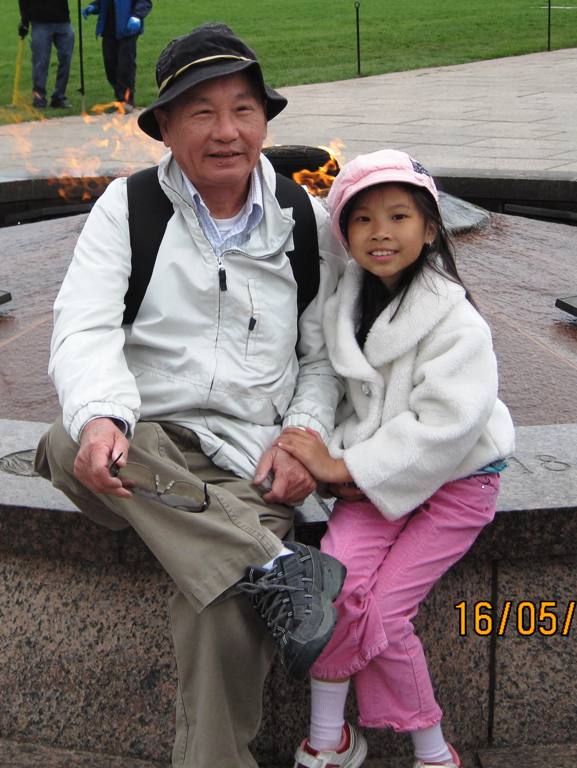
Bếp Lửa Ottawa
2 Years Ago
See Your Memories
GOSSIP
IN THE VILLAGE
I told no one,
but the snows came, anyway.
They weren't even serious about it, at first.
Then, they seemed to say, if nothing happened,...
http://www.newyorker.com/magazine/2014/05/05/gossip-in-the-village
GOSSIP
IN THE VILLAGE
I told no one,
but the snows came, anyway.
They weren't even serious about it, at first.
Then, they seemed to say, if nothing happened,
Snow could say that, & almost perfectly.
The village slept
in the gunmetal of its evening.
And there, through a thin dress once, I touched
A body so alive & eager I thought it must be
Someone else's soul. And though I was mistaken,
And though we
parted, & the roads kept thawing between snows
In the first spring sun, &itwas all, like spring,
Irrevocable, irony has made me thinner. Someday, weeks
From now, I will wake alone. My fate, I will think,
Will be to have no fate. I will feel suddenly hungry.
The morning will be bright, & wrong.
- Larry Levis
The New Yorker,
April 5, 2014
Buôn chuyện làng
Tớ đếch nói
với ai, nhưng, dù sao, tuyết tới.
Lúc thoạt đầu, họ chẳng thèm ngay cả tỏ ra nghiêm
trọng, về chuyện đó.
Rồi có vẻ như là họ muốn nói, nếu chẳng
có gì xẩy ra,
Tuyết có thể nói điều đó & hầu như tuyệt
hảo
Ngôi làng
ngủ, trong màu đồng đỏ, của những buổi chiều của nó.
Và ở đó, qua cái áo dài mỏng,
một lần, tôi sờ vô
Một cơ thể sống ơi là sống & hăm hở, tôi nghĩ
Hẳn là linh hồn một người nào đó.
Và, tôi đã lầm.
Và chúng
tôi lên đường & những con lộ băng tan giữa tuyết
Trong mặt trời đầu tiên của mùa xuân &
tất cả, như mùa xuân
Vô phương huỷ bỏ, cái tếu táo, buồn cười
làm tôi càng thêm ốm tong teo.
Vài ngày, vài tuần, kể từ bây giờ
Tôi sẽ thức giấc một mình.
Số phần của tôi, tôi nghĩ,
Là đếch có số phần.
Bất thình lình, tôi cảm thấy đói.
Buổi sáng thì sẽ sáng ngời & lầm lẫn.
Tập thơ này, mua xon, chỉ vì
cái tên người dịch và viết Tựa: Auden.
Auden
được coi là sư phụ của Brodsky. Khi bị đày qua Tây
Phương, ông được sư phụ chờ đón ở.... sân ga.
Đúng ra là phi trường, nhưng giá như chờ ở sân
ga, tuyệt hơn, “trong khi chờ tầu hỏa", là 1 hình ảnh
hợp với Brodsky, và cùng với ông, là nước Nga.
Bài “editô” của số báo Văn Học Tẩy, về văn chương
Nga, dùng cái tít này: En attendant le train!
Trong Khi Chờ Tầu Hỏa!
Nhân đọc mẩu viết về “tầu
hoả”, tức “xe lửa”, trên Blog NL, bèn nhớ tới số báo
này.
Bài "édito" thật tuyệt.
Cái tít làm nhớ đến Beckett, Trong Khi Chờ Godot, và đây
là dụng ý của tay viết.
Và của Gấu!
EN ATTENDANT LE TRAIN
MÉDITANT SUR TOLSTOI ET
DOSTOIEVSKI au fil d'un magistral essai (1), George Steiner ouvre une brève
parenthèse pour souligner le role stratégique des quais de
gare chez ces deux auteurs. Leurs trajectoires, si souvent opposées
et dont Steiner s'applique à minorer les divergences, se trouvent
ainsi réunies, en attendant le train, II ne faudrait pas toutefois
en conclure que le roman russe s'apparente à l'indicateur Chaix
et encore moins à une littérature de gare, encore que lire
Guerre et Paix dans le Transsibérien
demeure un projet séduisant. Et cohérent. Les héros
de Tolstoi comme ceux de Dostoievski aiment voyager par le train, Que
l'on songe à l'ouverture de L'ldiot, quand le prince
Muichkine et Rogojine approchent de Saint-Pétersbourg par le train
de Varsovie. Ou encore à la tragédie d'Anna Karénine
qui commence, comme elle finira, sur un quai de gare.
Vronsky, on le sait, part pour la guerre.
II existe d'autres destinations plus enviables. D'autant que le roman
russe profite de l'immensité de l'espace pour pousser ses héros
vers de lointaines et mythiques frontières, là où
campent les Cosaques, les tribus du Caucase, les vieux-croyants du Don
et de la Volga. Le héros tolstoien s'évade volontiers à
la campagne, et ce retour à la terre s'accompagne d'une résurrection
de l'âme. Le héros dostoievskien, pour sa part, cherche
son salut dans le royaume de Dieu, improbable destination que l'auteur
des Possédés conseillait ironiquement
de choisir plutôt en juin.
Quand, rompus de fatigue, les héros
restent à quai, c'est l'auteur qui part. Ainsi Tolstoi, abandonnant
au soir de sa vie de domicile conjugal pour retrouver les lieux de sa
jeunesse, fuyant vers le Caucase comme s'il voulait semer la mort qui
est à ses trousses. « Je m'en vais dans la solitude»,
écrit-il dans ses Carnets. Pour terminus, une
petite gare, à Astapovo, où il mourra en laissant sur sa
table de chevet deux livres, ultimes compagnons de voyage: Les Frères Karamazov et les Essais de Montaigne.
La Russie et l'Europe sont les deux patries
des auteurs russes. Tolstoi admirait Stendhal. De son coté,
Dostoievski avait lu avec passion Sand, Dickens, Balzac, Sue, Restif...
Reconnaissant sa dette envers la culture européenne, il faisait
dire à Ivan Karamazov: « Je veux voyager en Europe, Aliocha;
je veux sortir d'ici. Et pourtant, je sais que je ne trouverai qu'un
cimetière un très précieux cimetière, voilà
ce que c'est! » Quant à Gogol, il trouva sa Russie alors
qu'il pérégrinait à Paris, Rome ou Vevey.
Indifférente à tant de transports,
l'Europe à longtemps consideré avec froideur et réticence
les auteurs russes, On leur reprocha une débauche de pathos,
l'absence de contraintes esthétiques, trop de vie, trop de pages.
Comment faire face aces « grands monstres informes », selon
la redoutable expression d'Henry James? Tolstoi a écrit pas moins
de quatre-vingt-dix volumes et, jamais en mal d'inspiration, il se
risqua à bâtir une pièce de théatre en six
actes. Voulant rivaliser avec l'infinité, il faisait en sorte
que le dernier chapitre de chaque roman ménage un prélude
à l'oeuvre prochaine. II refusait de mettre un point final, et en
mit même trois pour éviter de tout à faire conclure
Guerre et Paix. Voilà l'un des miracles
de la littérature russe : les trains qui la traversent ne
s'arrêtent jamais.+
(1) George Steiner, Tolstoi ou Dostoievski, traduit de l'anglais par Rose Celli,
réed, 10/18, 2004.
Trở lại với tập thơ. Tuyệt.
Đi liền 1 bài
Foreword
Gunnar Bkelof was born in 1907 in Stockholm.
His father was a wealthy stockbroker who caught syphilis, became insane
and died while Bkelof was still a child; his mother was a member of
the petty nobility and does not seem to have shown him much affection.
Consequently, he had to find such happiness as he could in a private
dream world of his own. Of this early time he wrote:
My own childhood environment
was well-to-do but so far beyond the normal and so unrealistic that
there was good room for peculiar kinds of want .... I had books, music,
beautiful furniture around me, but they forced me to go long roundabout
ways before I could feel I had a legitimate right to them.
As Ekelof grew up,
he became engrossed in Oriental mysticism:
I learned to hate Europe and Christianity
and during the morning prayer at school I began to mumble Om mani
padme hum as a form of protest ...
In the Royal Library he discovered Tarjúmán
el-Ashwáq by Ibn el-Arabi which for a long time was his favorite book
and from which, he tells us, he first learned what is meant by Symbolism
and Surrealism. With the idea of emigrating to India, he went to London to
study at the School of Oriental Languages, but abandoned this scheme and
returned to Sweden to study Persian at the University of Uppsala. However,
a long illness prevented him from completing his studies. It was at this
time that he wrote his first poem:
One night I had an experience
that I would have to characterize as a form of ecstasy. It came over
me as a shower of shooting stars, and I remember staggering a bit on my
way home. As often on such occasions, I had had the usual orchestra playing
somewhere behind me, and I myself joined in with one instrument after
the other. Then it became a poem, my first fairly original one.
Ekelof's second great and lasting passion
was music and, in the 1920s, he went to Paris to study it, but soon
became absorbed by the problems of poetic language:
I placed one word beside another
and finally with a great deal of effort managed to construct a whole
sentence - naturally not one that' meant something' but one that was
composed of word-nuances. It was the hidden meaning that I was seeking
- a kind of Alchemie du verbe. One word has its meaning
and another word has its own, but when they are brought together something
strange happens to them: they have an in-between connotation at the same
time as they retain their original individual meanings . .. poetry is
this very tension-filled relationship between the words, between the
lines, between the meanings
It was in Paris, it would seem, that
he wrote many of the poems which appeared in his first book, Sent
pa Jorden (Late on the Earth), which was published in I932. This
he later described as a 'suicidal book":
I literally used to walk around
with a revolver in my pocket. Illegally, for that matter. In my general
despair I did everything possible to remain in my dream-world - or
to be quickly removed from it. I began to gamble and I lost my money,
which made my temporary return to Sweden quite definite.
Late on the Earth attracted little
critical attention, but by the time of the publication of Farjesang (Ferry
Song) in I941, he had become recognized as one of Sweden's leading poets.
The translations in this Penguin volume
are of two late works, Diurdn over Fursten av Emgión (Diwan
over the Prince of Emgión), 1965, and Sagan om Fatumeh
(The Tale of Fatumeh), 1966. His last volume, Vagvisare
till underjorden (Guide to the Underworld) was published in
1967. In 1968 he died of cancer of the throat.
The Prince of Emgión had appeared
in two earlier poems. Bkelof relates that, during a spiritualist seance
in Stockholm during the thirties, he had asked where his spiritual “I”
was to be found. The oracle, a drinking-glass placed upside down, replied:
'In Persia and his name is the Prince of Emgión.' Later, Ekelof
came to believe that this Prince was of Armenian-Kurdish stock, half a
Christian and half a Gnostic.
Diwan was begun in Constantinople
in 1965, and most or all of the poems were written within a period
of four weeks. , 'Dwan,' Ekelof wrote to a friend, 'is my greatest
poem of love and passion. I cannot touch it nor see it because I grow
ill when I see this blind and tortured man .... As far as I can understand,
someone has written the poems with me as a medium .... Really, I have
never had such an experience, or not one as complete.'
The character he here refers to is not
the Prince, but Digenis Acritas, the hero of an eleventh-century Byzantine
epic romance. Digenís was the son of an Arab father and a Byzantine
mother. Captured in battle, he was incarcerated in the prison of Vlacherne,
where he was tortured and blinded. In his suffering his principal consolation
is the Virgin, to whom he addresses passionate hymns. Though there are
references to what are obviously Christian icons, this figure is not the
Christian Madonna, but rather the Earth Mother, the Goddess known to us through
St Paul as the 'Diana of the Ephesians'. In Diwan another female
figure appears who is human, not divine, perhaps a wife, perhaps a sister
or daughter.
The Tale of Fatumeh is an equally
sad story. It tells of a generous, loving girl who becomes first a
courtesan and then the beloved of a prince, whose child she bears; she
is apparently deserted by him and brought to the Harem at Erechtheion,
but she is eventually thrown out of the Harem and spends a miserable
old age, selling herself to keep alive. Like Digenís, Patumeh
is sustained by her visions. Whatever has happened and may happen, no
disaster shall degrade her soul.
Like the Greek poet Constantine Cavafy,
Bkelof sets these poems in a bygone age. Different in sensibility as
they are - Cavafy is ironic and detached, Ekelof passionate and involved
- neither chooses the past as an escape: for both it is a means for
illuminating and criticizing the present. Although Ekelof was fascinated
by Byzantium, he never idealized it. 'Why,' he wrote in a letter,
'have I become interested in the Byzantine, the Greek life? Because
Byzantine life, traditionally and according to deep-rooted custom, is
like the political life in our cities and states. I am intensely interested
in it because I hate it. I hate what is Greek. I hate what is Byzantine
.... Diwan is a symbol of the political decadence we
see around us. Fatumeh is a symbol of the degradation,
the coldness between persons, which is equally obvious.'
Ekelof had a special numerological theory
and considered life an odd number and death an even number. His numerological
preoccupation is expressed in his division of The Tale of Fatumeh
into a nazm, a string of beads, and a tesbih; a rosary,
each consisting of twenty-nine numbered poems. This plan regrettably
had to be abandoned for this version. Some textual emendations have
also been made whenever Bkelof''s manuscripts have warranted such action.
W. H. AUDEN
LEIF SJOBERG
Penguin Modem European Poets
Advisory Editor: A. Alvarez
Selected Poems: Gunnar Ekelof
Gunnar Ekelof was born in Stockholm in 1907. Intending to
become a pianist, he studied music in Paris, and then took up Oriental
studies in London and U ppsala. His verse was from the first a highly
individual mixture of esoteric, even cryptic allusions and simple, homely
confessions. His first book, Late on the Earth (1932),
he called' a suicidal book'. It reflects an outlook fundamentally divided,
in which subject and object move unrelated as in a trance. It was regarded
by sonie as inspired by French Surrealism, a charge Ekelof denied. Nevertheless
it brought radical innovation to the forms of Swedish poetry. Ferry
Song (1941) and Non Serviam (1945) oscillate between mysticism
and intellectualism. In Strountes (1955), Opus Incertum (1959)
and A Night in Otolac (1961), he fashioned a poetry patently anti-aesthetic.
In A Moelna Elegy (1960) he dwells on the plurality
of times past and future, and of death in life. The remarkable Byzantine
triptych Diwan Fatumeh, Vagvisare (1965-7),
was dedicated to love absorbed by mystical identification, In addition
to his own fifteen books of verse Ekelof translated many foreign poets
into Swedish, amongst them Eliot.joyce, Auden, Baudelaire and Rimbaud.
By the time he last visited Asia Minor in 1965 he was acknowledged by
many as the greatest lyric poet Sweden has produced. He died of cancer
in 1968 and his ashes rest at the ancient city of Sardis.
You have the face of a dwarf-woman
With blue eyes, evil eyes
You are ugly and deformed
But what shall a man do
If not amuse himself?
The child you will bring forth
Between your stunted legs
will not live
Because I shall disown it
Angel! Forgive him and me
Who to satisfy my hunger
Must love at any price
Even the lowest.
Em có khuôn mặt của một
người đàn bà lùn tịt
Mắt xanh, mắt quỉ, mắt ma
Em xấu xí, méo mó
Nhưng 1 thằng đàn ông Bắc Kít như anh,
thì biết làm gì nếu không.... tự sướng?
Đứa con trai mà em mang tới cõi đời này,
từ cái cặp giò còi cọc của mình
Sẽ không sống
Anh sẽ không nhận nó là con
Thiên Sứ ơi! Hãy tha thứ cho nó và
tôi
Kẻ, để thoả mãn cơn đói của mình
Phải yêu với bất cứ giá nào
Ngay cả kẻ thấp kém, tồi tệ nhất.
Đọc,
thì bỗng nhớ đến tên Bắc Kít, óc bị thiến
1 mẩu, chê Jolie, xấu, ngu, miệng như cái gạt tàn!
Hay tên Lăng Băm!
Trăng
THE MOON
for Maria Kodama
There is such loneliness
in that gold.
The moon of the nights is not the moon
Which the first Adam saw. The long centuries
Of human vigil have filled her
With ancient lament. Look at her. She is your mirror.
[Trans. Willis Barnstone]
Trăng
Có nỗi cô tịch
như thế, ở trong khối vàng đó.
Trăng đêm không phải trăng Adam, thuỷ tổ giống người,
nhìn.
Những thế kỷ dài ăn chay cầu nguyện của con người
Đã tẩm vào nàng nỗi sầu vạn cổ.
Hãy nhìn nàng kìa.
Nàng là tấm gương của em đó.
JORGE
LUIS BORGES
Pythagoras, an old tradition holds,
used to write his verse in blood on a mirror.
Men looked to its reflection in the moon's
hoping thus to make his meaning clearer.
[Bản Penguin]
Pythagoras
(according to one tradition)
used blood to write upon a mirror,
and men read it by reflection
in that other mirror called the moon.
-Translated
by EDWIN HONIG
Pythagore
thường làm thơ bằng cách
Rỏ máu đầu ngón tay lên một tấm gương
Người đời sau nhìn phản chiếu trong trăng
Hy vọng nghĩa của nó trong sáng hơn
[Dịch sái đi, theo cách hiểu THNM của GCC]
The Moon
The story goes that in those far-off times
when every sort of thing was taking place-
things real, imaginary, dubious things-
a man thought up a plan that would embrace
the universe entire in just one book.
Relentlessly spurred on by this vast notion,
he brought off the ambitious manuscript,
polishing the final verse with deep emotion.
All set to offer thanks to his good fortune,
he happened to look up and, none too soon,
beheld a glowing disk in the upper air,
the one thing he'd left out-the moon.
The story I have told, although made up,
could very well symbolize the plight
of those of us who cultivate the craft
of turning our lives into the words we write.
The essential thing is what we always miss.
From this law no one will be immune
nor will this account be an exception,
of my protracted dealings with the moon.
Where I saw it first I do not know,
whether in the other sky that, the Greeks tell,
preceded ours, or one fading afternoon
in the patio, above the fig-tree and the well.
As is well known, this changing life of ours
may incidentally seem ever so fair,
and so it was on evenings spent with her
when the moon was ours alone to share.
More than moons of the night, there come to mind
moons I have found in verse: the weirdly haunting
dragon moon that chills us in the ballad
and Quevedo's blood-stained moon, fully as daunting.
In the book he wrote full of all the wildest
wonders and atrocious jubilation,
John tells of a bloody scarlet moon.
There are other silver moons for consolation.
Pythagoras, an old tradition holds,
used to write his verse in blood on a mirror.
Men looked to its reflection in the moon's
hoping thus to make his meaning clearer.
In a certain ironclad wood is said to dwell
a giant wolf whose fate will be to slay
the moon, once he has knocked it from the sky
in the red dawning of the final day.
(This is well known throughout the prophetic North
as also that on that day, as all hope fails,
the seas of all the world will be infested
by a ship built solely out of dead men's nails.)
When in Geneva or Zurich the fates decreed
that I should be a poet, one of the few,
I set myself a secret obligation
to define the moon, as would-be poets do.
Working away with studious resolve,
I ran through my modest variations,
terrified that my moonstruck friend Lugones
would leave no sand or amber for my creations.
The moons that shed their silver on my lines
were moons of ivory, smokiness, or snow.
Needless to say, no typesetter ever saw
the faintest trace of their transcendent glow.
I was convinced that like the red-hot Adam
of Paradise, the poet alone may claim
to bestow on everything within his reach
its uniquely fitting, never-yet-heard-of name.
Ariosto holds that in the fickle moon
dwell dreams that slither through our fingers here,
all time that's lost, all things that might have been
or might not have-no difference, it would appear.
Apollodorus let me glimpse the threefold shape
Diana's magic shadow may assume.
Hugo gave me that reaper's golden sickle
and an Irishman his pitch-black tragic moon.
And as I dug down deep into that mine
of mythic moons, my still unquiet eye
happened to catch, shining around the corner,
the familiar nightly moon of our own sky.
To evoke our satellite there spring to mind
all those lunar cliches like croon and June.
The trick, however, is mastering the use
of a single modest word: that word is moon.
My daring fails. How can I continue
to thrust vain images in that pure face?
The moon, both unknowable and familiar,
disdains my claims to literary grace.
The moon I know or the letters of its name
were created as a puzzle or a pun
for the human need to underscore in writing
our untold strangenesses, many or one.
Include it then with symbols that fate or chance
bestow on humankind against the day-
sublimely glorious or plain agonic-
when at last we write its name the one true way.
-A.S.T.
Penguin ed
|

